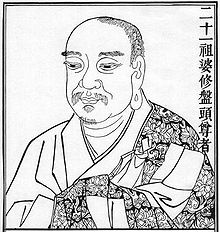Vasubanduo
 | |
| Sanskrite: | वसुबन्धु |
| Ĉine: | 世親 (Shìqīn) |
| Informoj | |
|---|---|
| Skolo: | Yogācāra |
Vasubanduo estis grava bikŝuo el Gandaro kaj unu el la fondintoj de la skolo Yogācāra kune kun sia frato Asango.
Lia komentario pri la Abidarmo, la Abhidharmakośakārikā, estas uzita en tibeta kaj orientazia budhismoj kiel fonto de nemahajana abidarma filozofio.[1]
Referencoj
[redakti | redakti fonton]Bibliografio
[redakti | redakti fonton]- David J. Kalupahana, The Principles of Buddhist Psychology, State University of New York Press, Albany, 1987, pp 173–192.
- Francis H. Cook, Three Texts on Consciousness Only, Numata Center for Buddhist Translation and Research, Berkeley, 1999, pp 371–383 ("Thirty Verses on Consciousness Only") and pp 385–408 ("Twenty Verses on Consciousness Only")
- Erich Frauwallner, The Philosophy of Buddhism, Motilal Banarsidass, Delhi, 2010 [1956].
- Li Rongxi, Albert A. Dalia (2002). The Lives of Great Monks and Nuns, Berkeley CA: Numata Center for Translation and Research
- Thich Nhat Hanh Transformation at the Base (subtitle) Fifty Verses on the Nature of Consciousness, Parallax Press, Berkeley, 2001; inspired in part by Vasubandhu and his Twenty Verses and Thirty Verses texts
- Kochumuttom, Thomas (1982). A Buddhist Doctrine of Experience: A New Translation and Interpretation of the Works of Vasubandhu the Yogacarin. Delhi: Motilal Banarsidass
